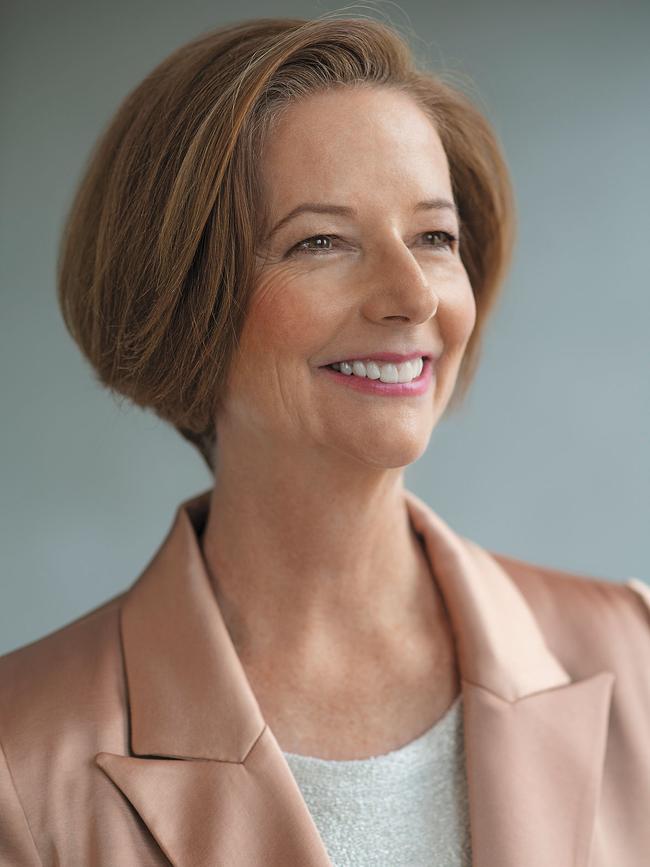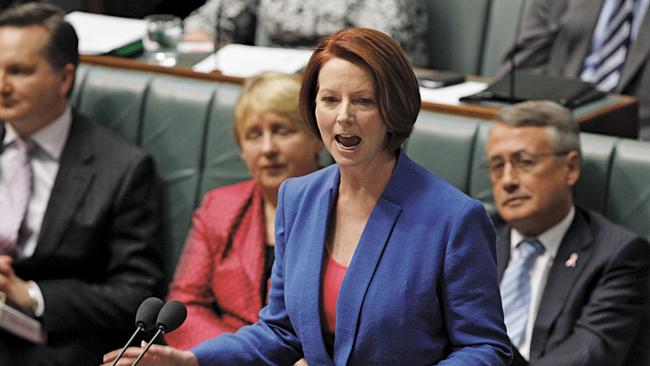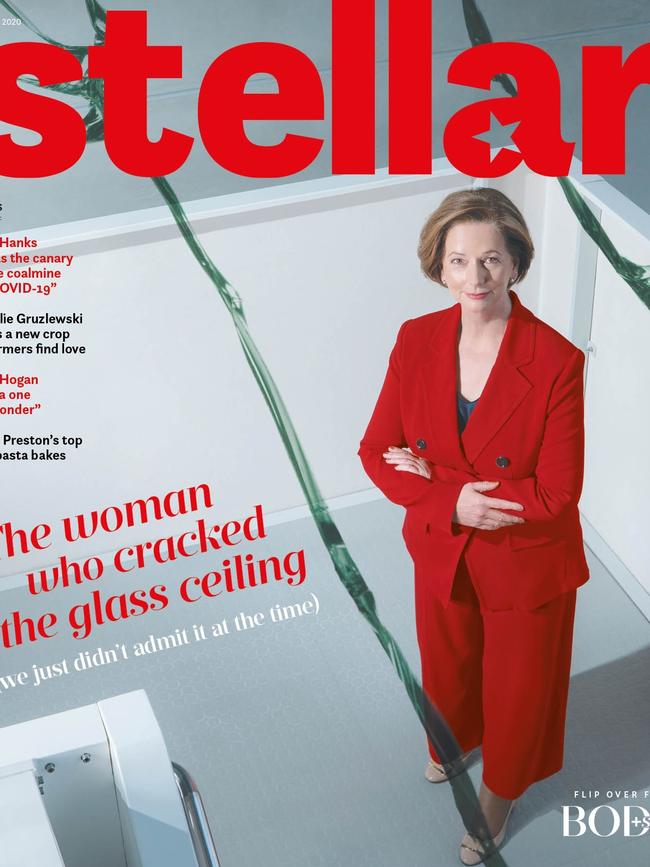Julia Gillard is amazed her misogyny speech still resonates
Ten years on from becoming the first female prime minister of Australia, Julia Gillard opens up to Stellar in a candid interview about being a role model for women in politics, her surprise that her misogyny speech is still talked about 10 years on and reveals whether she still talks to Kevin Rudd.
Stellar
Don't miss out on the headlines from Stellar. Followed categories will be added to My News.
- Alex Perry on how Charlotte Dawson’s death changed him
- Jan Fran: ‘I’d love for “brown people on TV” to be normalised’
Can we start by going back to June 24, 2010 when you became Australia’s first female prime minister? We just marked a decade since that milestone – how do you look back on that moment?
For me, looking back isn’t so much about one moment. It’s about the years in government and what we achieved. I went into politics to make a difference with a set of beliefs and a sense of purpose around what I wanted to do. I went in fascinated by education, the politics of opportunity and to make a difference to people’s lives even if they came from disadvantaged circumstances.
At the time, it was very much frowned upon to even acknowledge the historical significance of you becoming our first female prime minister. Do you agree the status quo in 2010 was very much to act like it really was no big deal?
I think there’s a few threads of that for me, becoming prime minister then leading the party to the 2010 election. My view was it would be so noted I was the first woman in that position that I personally didn’t need to draw attention to it. But it would have been, to Labor, an obvious point. And the initial reaction had a “you go, girl” around it – women and girls marking the moment, and sympathetic men as well, thinking this is a moment in history, a good time to talk to my daughter about how there are no barriers and [it] shows that girls can aim to do anything.
And if I had a dollar for every conversation I had with people along those lines in the years since – people who stopped me in the streets and airports or wherever to say, “I know exactly where I was when you became prime minister, and I know exactly the conversation I had with my daughter that day” – then I’d be a very rich woman indeed.
So there was all of that, and I didn’t want to play on the obvious. Having said that, I think so many things about the reaction to me as a leader were through the prism of gender. The fascination with appearance – if someone did the research comparing column inches spent on my appearance in the days after compared to Malcolm Turnbull when he took over from Tony Abbott… (laughs) [And] there was a sense, obviously, I became prime minister in circumstances where I asked for a ballot against a sitting prime minister. That had been done before by Paul Keating against Bob Hawke, and it has certainly been done since.

But I think there was framing done around a woman and power that was also driven by gender assumptions and the stereotypes in the back of our brain; that we expect men to seek power, but we don’t expect women to do it. So I think there was a whole lot about the reaction to me that was incredibly gendered.
But I think we are having a completely different conversation about gender and politics now than we were having then. And for me that’s progress, that’s a good thing. We only ever solve problems by talking about them. That’s how humans have solved problems through history. We may not have the solution at our fingertips, but at least we’re having the right conversation.
There will be some people rolling their eyes as they read this – they will accuse us of playing the so-called gender card and insist nobody cares whether a leader is male or female. What do you say to them?
Well, I’d say firstly and simply, do the maths. If you believe merit is equally distributed between the sexes and humans, then how is it you can look at our world and say overwhelmingly its nations have never been led by a woman? And the nations that have been led by a woman mostly have been led by one woman.
If you look at that, there are two conclusions: if you think merit is evenly distributed, something is holding women back. Let’s analyse what they are and try to clear them out of the way. Or you need to say to yourself that merit is not evenly distributed and men are more adapted for leadership, which I find an offensive statement, but some people will come to that conclusion. But what you can’t do is say there are no barriers for women. Look at that maths – it’s impossible to explain on that basis.

The three years when you were PM were in many ways a particularly toxic time. Were there days you struggled to get out of bed and face it all?
Oh look, no in some senses. I’m not trying to be Doris Day about it and pretend I woke up singing ‘What A Wonderful World’. I was conscious there were all of these pressures on my shoulders; being prime minister for anybody isn’t an easy job. And I had this added thread of gender.
I was conscious of that and sometimes very physically or intellectually tired, and you did feel like you were pushing yourself up and out into the world when you’d prefer to be at home at rest.
But the more dominant side knew there were things we wanted to get done. I’m a big believer in Paul Keating’s statement “not a day to waste”. Time is a precious thing while you’re there, and it’s never long enough for everything you want to do. So that driving sense of purpose was the bigger influence on me.
On a flight last year, you were passed a handwritten message from another passenger, a public-service worker called Kate, who wrote: “You smashed that glass ceiling out of the park for so many of us. When one of us is being unfairly sidelined, we use the term ‘WWJD’ – ‘What would Julia do?!’ It’s our rallying cry to be the absolute best at our jobs.” Notes like that must make the difficult times seem worthwhile.
That note was heartwarming and had a particular beauty about it, but I do get those sentiments expressed quite a lot, and much of my time since I left office has been spent trying to make things easier for women to come.
I’m conscious of the role- model effect from being prime minister, but I do want my efforts to speak now and be beyond a role-modelling effect. And to hopefully be part of the wonderful research team at the global institute [Gillard chairs the Global Institute for Women’s Leadership] and share tips and strategies for women in their everyday lives.
Your new book Women And Leadership, co-authored by economist Ngozi Okonjo-Iweala, has a lot of practical advice for women. What’s your basic takeaway for a woman looking for a tip?
If I could make it two tips – one is it’s important to be very clear about what you want to do. When I was prime minister, I was advised to do that by a UK friend of mine – to write down what the purpose was for the government I led. And I kept that with me and found it tremendously handy to have that piece of paper with that on it. So number one, that clarity. Then number two, realise there will be gender treatment and not let that deter you from embarking on this journey into leadership.

An impressive rollcall of world leaders feature in the book. So, despite the differences in the countries you respectively lead or led, your personal situations and your generations, and indeed your political views, there seemed to be a sisterhood of sorts?
Our book has two foundation stones: one is the interviews with eight women leaders and the other is the research that has happened around women leaders. And we put that research to the women, and out of the research we draw a hypothesis to present to them, and one of them is exactly on this point: do women support women? Or do we succumb to the theory that there is only one seat at the table? And I think, increasingly, women are seeing through that scarcity and wanting to do the endeavour of coming together and changing the rules of the game. And I think there is a real sense of responsibility about sharing the lessons, mentoring and sponsorship, and the women who gave interviews are all busy people and some of them are still leading nations. So every minute is precious. They did that because they want to nurture that spirit of bringing women together and support one another on their journey to leadership.
One of the women interviewed in the book is Hillary Clinton. She has thus far failed to realise her dream of being the first female president of the United States, but is it fair to say her defeat has helped galvanise a generation of women out of their complacency?
I think you’re absolutely right to say that Hillary’s loss shook women in America and around the world out of any sense of complacency. I think it was fairly easy for women, particularly younger women, to think, “Yeah there’s still difference in gender, but a lot’s changed and it’ll keep changing and maybe it should be faster, but the direction of travel is always up.”
And I think Hillary’s loss signalled what has been the historical truth of the feminist struggle, which is every wave of advance has been met with a backlash. It’s never better today, better again tomorrow or the day after.
It tends to be a few steps forward and a step back, so over time things do get better, but if you aren’t conscious there’s going to be that backlash, then you get complacent. And Donald Trump’s victory reminded people profoundly of that backlash and re-energised women of the struggle, which I think is a great thing. The more energy that goes in, the more able we are to overwhelm the backlash and the more we’re able to accelerate the momentum.
MORE STELLAR
Cate Campbell: ‘I’ve missed being in the water’
Deborra-lee Furness: ‘I don’t want to be judged as Mrs Jackman’
Former US president Barack Obama’s deputy national security advisor Ben Rhodes recently revealed Obama’s team used to watch your now infamous misogyny speech whenever they were “really annoyed” with Tony Abbott. Are you surprised that speech, delivered in parliament in October 2012, is still a talking point internationally? And, it would seem, serves as a therapy session of sorts?
I was aware at the time that President Obama watched the speech – way back when I was prime minister he mentioned that he had watched the speech – but what I didn’t know until Ben said that was it was something that was done repeatedly (laughs) when Abbott was in office.
I had no inkling, zero inkling, when I did the speech that we would still be talking about it all these years later. And if anyone suggested to me that we’d still be talking about it in 2020, I would have said that was ridiculous.
Yet here we are, and in some ways I’m surprised, but in other ways I’ve come to understand what that speech has represented for women, and some men. It’s come to represent what they wished they’d be able to do in the moment they’ve experienced gender treatment.
And people have watched it over and over to decompress when they feel like they’ve been badly treated, or get themselves ready to go into a gender battle that will be difficult for them. So it’s served as a motivational tape or talk in that sense, and I’m obviously very pleased and somewhat amazed that has occurred.

Are you still in contact with Tony Abbott these days? Or Kevin Rudd?
No, I’m not in contact in the sense of making calls or anything like that. You end up running into people or going to events together. I saw Kevin at the ALP launch just over a year ago for the election campaign. I’ve seen Tony from time to time, mostly in flight lounges and airports, so sort of occasional meetings.
Does Scott Morrison ever call you?
(Laughs) Ah no, but I’ve seen him in a couple of ways. [I am] chair of Beyond Blue and he’s taken a personal interest in Australia’s suicide rate and bringing it down, and I work closely with Greg Hunt, the health minister, who is very passionate about mental health.

The removal of Kevin Rudd by his own party room to be replaced by you 10 years ago marked the beginning of eight years of leaders of both sides of politics being removed in that way. Could you have foreseen the turbulent years ahead, and do you think those years of internal bloodshed have now stopped?
In analysing all of these things, I think inevitably when Australian journalists and commentators report on politics, they focus on things here. But really there’s a broader analysis here, and if we look around the world, this is a very unpredictable time in democratic politics across democracies generally... There’s increasing frustration in many parts of the world with equality, the financial crisis, the failure to reckon with historic inequalities.
There’s a general fear in many communities about the future and if their kids will live a better life than they had or where technology is taking us. All of that, I think, is feeding political changes that none of us would have predicted years ago, so I think it’s a mistake to analyse any of this in terms of personality factors. Not that personality doesn’t matter, but I think there are more broader things going on. In terms of Australian politics, I’m not a commentator on that, but both parties have put in rules which are different from when I or Tony or Malcolm or Kevin were in politics.
There is a view among many Australians that of all the former PMs of the past decade, you have handled yourself with the most dignity and class. Has that been a conscious decision on your part these past seven years?
I made a set of decisions, not in any way based on around how I would be perceived, but important to me in this period of my life… So decision number one: if you are not there, don’t hang around to loom over the people who are there. And decision number two: outside of parliament, it’s not appropriate, in my view, to be a commentator. And the other decisions I’ve made have been around causes I’m passionate about – and they’ve all been selected because they matter to me.
Women And Leadership by Julia Gillard and Ngozi Okonjo-Iweala (Penguin Random House, $34.99) is out today.
